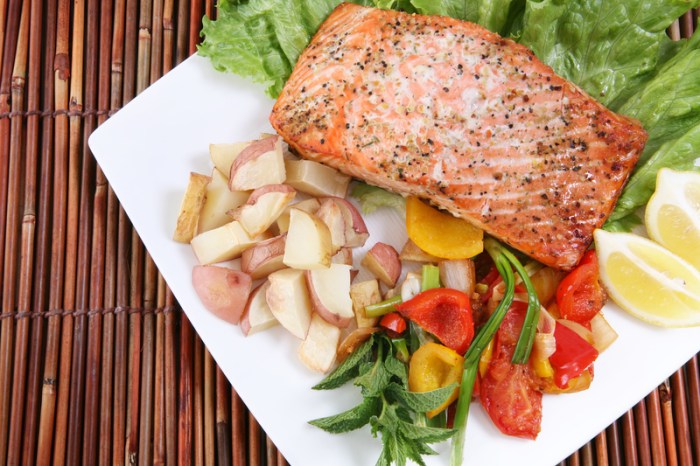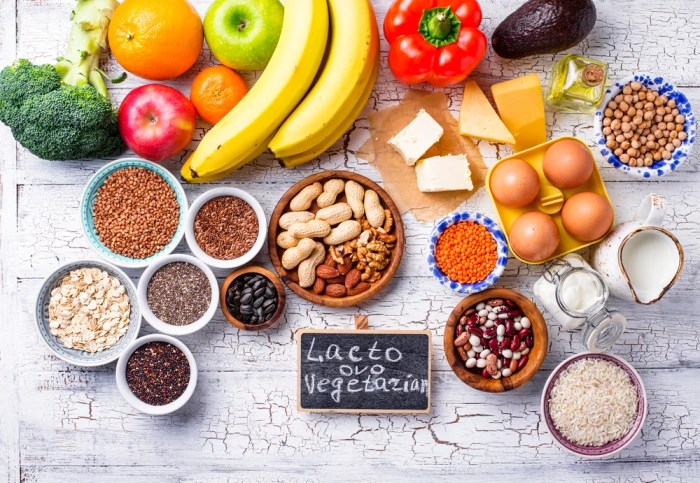Lacto ovo pesco vegetarianism is a popular variation of a vegetarian diet that allows for the consumption of dairy products, eggs, and fish. This dietary choice offers a balanced approach to plant-based eating while accommodating ethical and nutritional considerations.
Unlike vegans, who exclude all animal products, lacto ovo pesco vegetarians enjoy the benefits of dairy and eggs, which provide essential nutrients like calcium, vitamin D, and protein. The inclusion of fish further diversifies the diet, offering omega-3 fatty acids and other essential nutrients.
Definition and Overview
A lacto ovo pesco vegetarian diet excludes meat, poultry, fish, and eggs but includes dairy products and honey.
This type of vegetarianism differs from other vegetarian diets in that it includes dairy products and eggs. Lacto-ovo vegetarians consume dairy products like milk, cheese, and yogurt, as well as eggs. Pesco vegetarians include fish and other seafood in their diet, while vegans exclude all animal products, including dairy, eggs, and honey.
Dietary Restrictions
A lacto ovo pesco vegetarian diet excludes meat, poultry, fish, and shellfish. However, it does include dairy products, eggs, and fish.
The primary reason for these dietary restrictions is ethical concerns about animal welfare. Lacto ovo pesco vegetarians believe that it is wrong to kill animals for food and that animals should not be subjected to the conditions often found in factory farming.
Included Foods
- Fruits
- Vegetables
- Whole grains
- Legumes
- Nuts
- Seeds
- Dairy products
- Eggs
- Fish
Excluded Foods
- Meat
- Poultry
- Fish (for pesco vegetarians)
- Shellfish
- Animal-derived products (e.g., gelatin, lard)
Nutritional Considerations
A lacto ovo pesco vegetarian diet can provide adequate nutrition, but it requires careful planning to ensure the intake of all essential nutrients. Here’s an analysis of the nutritional adequacy of this diet and tips on maintaining a balanced and healthy intake.
Protein
Lacto ovo pesco vegetarians can obtain sufficient protein from dairy, eggs, and plant-based sources such as beans, lentils, tofu, and tempeh. It’s recommended to consume a variety of protein sources throughout the day to meet the body’s amino acid requirements.
Iron
Iron deficiency is a potential concern for lacto ovo pesco vegetarians. Plant-based iron sources have lower bioavailability than heme iron found in animal products. To enhance iron absorption, pair plant-based iron sources with vitamin C-rich foods like citrus fruits or leafy greens.
Vitamin B12
Vitamin B12 is exclusively found in animal products. Lacto ovo pesco vegetarians can obtain this vitamin from dairy and eggs, but it’s crucial to ensure adequate intake. Consider fortified foods or supplements to prevent deficiency.
Calcium
Dairy products are a rich source of calcium. Lacto ovo pesco vegetarians can meet their calcium needs by consuming milk, yogurt, and cheese. Plant-based calcium sources include fortified plant milks, leafy greens, and tofu.
Omega-3 Fatty Acids
Omega-3 fatty acids are primarily found in oily fish. Lacto ovo pesco vegetarians can obtain these essential fatty acids from eggs and plant-based sources like flaxseeds, chia seeds, and walnuts.
Embark on a culinary adventure with the meat vegetable diet , a symphony of flavors that tantalizes your taste buds. This harmonious blend of hearty meats and vibrant vegetables nourishes your body and delights your palate. From succulent steaks to crisp salads, every bite offers a satisfying balance of protein and essential nutrients, ensuring you stay energized and vibrant throughout the day.
Health Benefits: Lacto Ovo Pesco Vegetarian

A lacto ovo pesco vegetarian diet has been associated with several potential health benefits. Studies have shown that it can reduce the risk of chronic diseases, aid in weight management, and promote overall well-being.
Chronic Disease Risk Reduction
Research suggests that a lacto ovo pesco vegetarian diet may help reduce the risk of certain chronic diseases, such as:
- Heart Disease:Plant-based diets rich in fruits, vegetables, and whole grains have been linked to a lower risk of heart disease. Vegetarian diets are typically low in saturated fat and cholesterol, which can contribute to plaque buildup in arteries.
- Type 2 Diabetes:A lacto ovo pesco vegetarian diet is high in fiber, which can help regulate blood sugar levels and improve insulin sensitivity.
- Certain Cancers:Studies have shown that vegetarians have a lower risk of developing certain types of cancer, including colon, prostate, and breast cancer. This may be due to the high intake of antioxidants and phytochemicals found in plant-based foods.
Weight Management
A lacto ovo pesco vegetarian diet can be effective for weight management. Plant-based foods are typically lower in calories and higher in fiber than animal products. Fiber promotes satiety and helps control appetite.
Overall Well-being
In addition to reducing the risk of chronic diseases and aiding in weight management, a lacto ovo pesco vegetarian diet may also promote overall well-being. Vegetarian diets are rich in vitamins, minerals, and antioxidants, which can support immune function, energy levels, and skin health.
Ethical and Environmental Considerations

The adoption of a lacto ovo pesco vegetarian diet is often motivated by ethical concerns about the treatment of animals in the food industry. Vegetarians believe that animals should not be subjected to unnecessary suffering or exploitation, and that a plant-based diet is a more compassionate choice.
In addition to ethical concerns, environmental sustainability is another important consideration for many lacto ovo pesco vegetarians. Animal agriculture is a major contributor to greenhouse gas emissions, water pollution, and deforestation. By reducing or eliminating the consumption of animal products, vegetarians can help to reduce their environmental impact.
If you’re looking for a balanced and healthy way to nourish your body, consider adopting a meat vegetable diet. This approach combines the benefits of both meat and vegetables, providing you with essential nutrients and energy. By incorporating lean meats into your meals, you’ll receive a rich source of protein, iron, and zinc, while the vegetables offer a plethora of vitamins, minerals, and antioxidants.
Animal Welfare
- Factory farming practices often involve overcrowding, unsanitary conditions, and the use of antibiotics to prevent disease. These conditions can lead to significant suffering for animals.
- Vegetarianism promotes the well-being of animals by reducing the demand for animal products and supporting farming practices that prioritize animal welfare.
Environmental Sustainability
- Animal agriculture is a major contributor to greenhouse gas emissions, primarily due to the production of methane from cattle and other ruminants.
- Vegetarian diets can help to reduce greenhouse gas emissions by reducing the demand for animal products and supporting more sustainable farming practices.
- Animal agriculture is also a major contributor to water pollution, due to the runoff of manure and other waste products. Vegetarian diets can help to reduce water pollution by reducing the demand for animal products.
- Animal agriculture is a major driver of deforestation, as forests are cleared to create grazing land for cattle and other animals. Vegetarian diets can help to reduce deforestation by reducing the demand for animal products.
Challenges and Tips

Adopting a lacto ovo pesco vegetarian diet can present certain challenges, particularly during social situations or when dining out. However, with proper planning and awareness, these challenges can be effectively overcome.
Common challenges faced by lacto ovo pesco vegetarians include:
- Finding suitable food options, especially when dining out or traveling.
- Ensuring adequate intake of essential nutrients, such as protein, iron, and vitamin B12.
- Navigating social situations where non-vegetarian options are prevalent.
To address these challenges, consider the following practical tips and strategies:
Food Options
- Research restaurants and grocery stores in advance to identify those that offer vegetarian-friendly options.
- When dining out, inquire about vegetarian dishes and request modifications if necessary.
- Pack snacks and meals when traveling to ensure access to suitable food choices.
Nutrient Intake
- Consume a variety of plant-based protein sources, such as beans, lentils, tofu, and nuts.
- Include fortified foods, such as plant-based milk and cereals, to increase iron intake.
- Consider consulting a registered dietitian or healthcare professional for personalized advice on meeting nutritional needs.
Social Situations, Lacto ovo pesco vegetarian
- Politely decline non-vegetarian food options and explain your dietary choices if desired.
- Bring your own vegetarian dishes to social gatherings to ensure you have something to eat.
- Find support from other vegetarians or like-minded individuals to navigate social situations more confidently.
Closing Summary
In summary, the lacto ovo pesco vegetarian diet provides a balanced and ethical approach to plant-based eating. It offers a wide range of nutrient-rich foods while aligning with ethical concerns about animal welfare and environmental sustainability. Whether for health, ethical, or environmental reasons, adopting a lacto ovo pesco vegetarian diet can be a rewarding and fulfilling choice.
FAQ Section
What are the main differences between lacto ovo pesco vegetarianism and other types of vegetarian diets?
Lacto ovo pesco vegetarians consume dairy products, eggs, and fish, while vegans exclude all animal products, and lacto vegetarians exclude eggs and fish.
Is a lacto ovo pesco vegetarian diet nutritionally adequate?
Yes, a well-planned lacto ovo pesco vegetarian diet can provide all the essential nutrients, including protein, calcium, iron, and vitamin B12.
What are the potential health benefits of a lacto ovo pesco vegetarian diet?
Studies have linked lacto ovo pesco vegetarian diets to a lower risk of chronic diseases such as heart disease, stroke, and certain types of cancer.
Is a lacto ovo pesco vegetarian diet ethical?
For many lacto ovo pesco vegetarians, ethical concerns about animal welfare and environmental sustainability play a role in their dietary choices.